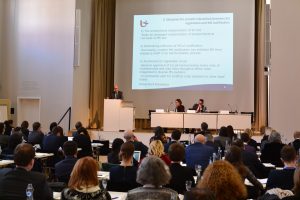Views
How European is European Private International Law? – Impressions from Berlin
Written by Tobias Lutzi, DPhil Candidate and Stipendiary Lecturer at the University of Oxford
 Last weekend, more than a hundred scholars of private international law followed the invitation of Jürgen Basedow, Jan von Hein, Eva-Maria Kieninger, and Giesela Rühl to discuss the ‘Europeanness’ of European private international law. Despite the adverse weather conditions, only a small number of participants from the UK – whose presence was missed all the more dearly – were unable to make it to Berlin. Thus, the Goethe-Saal of the Max Planck Society’s Harnack House was packed, and so was the conference programme, which spanned over two full days. Read more
Last weekend, more than a hundred scholars of private international law followed the invitation of Jürgen Basedow, Jan von Hein, Eva-Maria Kieninger, and Giesela Rühl to discuss the ‘Europeanness’ of European private international law. Despite the adverse weather conditions, only a small number of participants from the UK – whose presence was missed all the more dearly – were unable to make it to Berlin. Thus, the Goethe-Saal of the Max Planck Society’s Harnack House was packed, and so was the conference programme, which spanned over two full days. Read more
This one is next: the Netherlands Commercial Court!
By Georgia Antonopoulou, Erlis Themeli, and Xandra Kramer, Erasmus University Rotterdam (PhD candidate, postdoc researcher and PI ERC project Building EU Civil Justice)
Following up on our previous post, asking which international commercial court would be established next, the adoption of the proposal for the Netherlands Commercial Court by the House of Representatives (Tweede Kamer) today answers the question. It will still have to pass the Senate (Eerste Kamer), but this should only be a matter of time. The Netherlands Commercial Court (NCC) is expected to open its doors on 1 July 2018 or shortly after. Read more
A European Law Reading of Achmea
Written by Prof. Burkhard Hess, Max Planck Institute Luxembourg.
An interesting perspective concerning the Achmea judgment of the ECJ[1] relates to the way how the Court addresses investment arbitration from the perspective of European Union law. This paper takes up the judgment from this perspective. There is no doubt that Achmea will disappoint many in the arbitration world who might read it paragraph by paragraph while looking for a comprehensive line of arguments. Obviously, some paragraphs of the judgment are short (maybe because they were shortened during the deliberations) and it is much more the outcome than the line of arguments that counts. However, as many judgments of the ECJ, it is important to read the decision in context. In this respect, there are several issues to be highlighted here: Read more
News
9th Journal of Private International Law Conference: Registration is now open!

We are pleased to announce that registration is now open for the 9th Journal of Private International Law Conference. The conference will be held on 3 to 5 August 2023 at the Yong Pung How School of Law at the Singapore Management University. The keynote address will be delivered by The Honourable Justice Philip Jeyaretnam, President of the Singapore International Commercial Court.
The deadline for speakers to register is 30 May 2023. The deadline for other registrants is 15 July 2023.
Registration is complimentary for speakers, Journal of Private International Law editorial board members and SMU faculty, staff and students. Preferential rates apply for academics, government officials, SMU alumni and non-SMU students – register with your institutional e-mail to enjoy the preferential rate.
More information, including the draft programme and link to register, can be found here. We look forward to welcoming you to Singapore.
Friendly Reminder: “Globalization through the re-codification of property law?”
As announced earlier on this blog, Professor Amnon Lehavi, Harry Radzyner Law School, Reichman University, Israel, will be speaking about ‘Globalization through the re-codification of property law?”:
The globalization of markets, technology, and interpersonal networks poses a growing challenge for national legal systems. Property law is traditionally considered a “domestic” field of law, not only because of its structural features (such as the in rem or numerus clausus principles), but also because it promotes cultural, economic, and social values. The decision if property law should be globalized also requires a choice among potential globalization strategies (how to do so). This lecture examines four globalization strategies: (1) soft law / private ordering; (2) conflict of laws; (3) approximation; and (4) supranationalism. It does so by comparing three types of assets: land, digital assets, and cultural property – which have all been dramatically affected by current processes of globalization, albeit in diverging ways. It is argued that different strategies of globalization, and corresponding forms of re-codification of national property laws, should be adopted for land, digital assets, and cultural property.
The event will take place on 17 May at 6.30pm at the Senate Hall of the University of Bonn; it can also be joined via Zoom. The flyer can be found here.
Seminar on the Service and Evidence Regulations recast – at Maastricht University on 19 June 2023 (in Dutch)


A seminar will be held on 19 June 2023 at Maastricht University in the Netherlands concerning the Service and Evidence Regulations recast (see here our previous post regarding these regulations).
This seminar is being organised within the framework of the DIGI-GUARD project, which is co-funded by the European Union under the JUST-2021-JCOO program and which stands for Digital communication and safeguarding the parties’ rights: challenges for European civil procedure.


